Thomas Russell, United Irishman
Published in 18th-19th Century Social Perspectives, 18th–19th - Century History, Features, Issue 1 (Spring 2002), The United Irishmen, Volume 10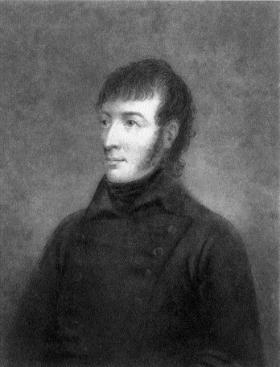
Thomas Russell—‘a model of manly beauty’ according to Mary Ann McCracken. (R.R. Madden, United Irishmen)
On 2 July 1790 two young men engaged in a spirited argument over the merits of the Whig party in the public gallery of the Irish House of Commons. The two were Theobald Wolfe Tone, an under-employed barrister, and Thomas Russell, an army officer on half pay. The argument, however, was a friendly one, and the two men took an instant liking to each other. That summer Russell spent much of his time at the Tone’s cottage in Irishtown, where he and Tone continued their arguments and bantering, and became firm friends. Looking back on his meeting with Russell Tone described it as a circumstance which I look upon as one of the most fortunate of my life. He is a man whom I love as a brother…to an excellent understanding, he joins the purest principles and the best of hearts…He well knows how much I esteem and love him, and I think there is no sacrifice that friendship could exact that we would not with cheerfulness make for each other, to the utmost hazard of life or fortune. There cannot be imagined a more perfect harmony, I may say identity of sentiment, than exists between us; our regard for each other has never suffered a moment’s relaxation from the hour of our first acquaintance, and I am sure it will continue to the end of our lives. I think the better of myself for being the object of the esteem of such a man as Russell.
It was a crucial meeting for both men. They developed an important political partnership and a friendship of moving intensity, characterised by their own rough-and-tumble banter, in-jokes and nicknames. Tone dubbed Russell ‘P.P.’, after the fictional character of an earnest young cleric, whose good intentions to live a pious and wholesome life were invariably frustrated by his fondness for wine and women. Tone, four years Russell’s senior, often adopted the role of older brother to his younger friend, frequently harrying him with advice. It was a role he enjoyed playing: on a visit to Belfast without Russell he noted: ‘Generally sulky. Want P.P. in order to advise him. Just in a humour to give advice.’ But Russell was much more than a butt for Tone’s jests. Tone craved his encouragement and approval, and during his long exile in France continually lamented his friend’s absence.
Russell, born at Betsborough, near Mallow, County Cork, in 1767, was the son of an army lieutenant, and in the early 1770s the family moved to Dublin after Lieutenant Russell’s appointment as Captain of Invalids at the Royal Hospital, Kilmainham. Soldiering was in the Russell blood—all three of Russell’s brothers saw military service, and at the age of fifteen Thomas sailed with his brother’s regiment to India, where he was commissioned ensign in the 100 regiment of foot in July 1783. He saw action in the Mysore wars at Mangalore and Cannanore and distinguished himself by carrying his wounded commanding officer from the battlefield.
‘A model of manly beauty’
He returned to Ireland about 1786, contemplated becoming a clergyman but decided against it, and spent the next four years as a half-pay officer in Dublin, living at the
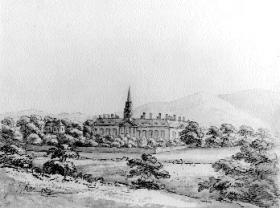
Royal Hospital, Kilmainham, Dublin—in the early 1770s the Russell family lived there after his father’s appointment as Captain of Invalids. Thomas returned in 1786 as an officer on half pay. (National Gallery of Ireland)
Royal Hospital. In September 1790, some months after his meeting with Tone, he took up a full-time ensigncy with the 64th regiment stationed in Belfast. He enjoyed the life of a young army officer in Belfast; his military duties were light and he regularly staggered home in the early hours of the morning from Belfast’s taverns and brothels. A charming and strikingly handsome man, Russell was warmly received by fashionable Belfast society. A leading Belfast woman of the time, Mary Ann McCracken, described the impression he made:
A model of manly beauty, he was one of those favoured individuals whom one cannot pass in the street without being guilty of the rudeness of staring in the face while passing, and turning round to look at the receding figure. Though more than six feet high, his majestic stature was scarcely observed owing to the exquisite symmetry of his form…The classic contour of his finely formed head, the expression of almost infantine sweetness which characterised his smile, and the benevolence that beamed in his fine countenance, seemed to mark him out as one who was destined to be the ornament, grace and blessing of private life.
For his part, Russell was drawn to Belfast’s liberal circles and was invited to join several political clubs, in which he met the town’s radical Presbyterian merchants and manufacturers. He became involved in the preparations to found the United Irishmen, and drew Tone into the business by asking him to write the resolutions for a new society; he also played a key role in forging links with Catholic activists. He had corresponded with leading Catholics throughout 1791, and he persuaded his Presbyterian colleagues of their willingness and capacity to engage in a broadly-based campaign for political reform. Russell himself was a devout man who adhered to a non-sectarian Christianity which stressed the elements that united Christians rather than divided them; although his father was a Protestant, he was probably recently descended from Catholics, and Russell’s mother may in fact have been a Catholic.
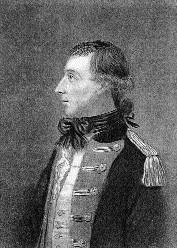
Theobald Wolfe Tone—four years Russell’s senior, he often adopted the role of older brother to his younger friend, frequently harrying him with advice. (R.R. Madden, United Irishmen)
Society of United Irishmen
After the founding of the Belfast United Irishmen in October 1791, he participated in founding a sister society in Dublin the following month. Soon afterwards, however, he was compelled him to put politics aside to earn a living. In Belfast he had gone bail for an American confidence trickster, Thomas Attwood Digges, and when the American absconded Russell was forced to sell his commission to meet the bond. After several months he accepted the offer of Viscount Northland of Tyrone, the father of an old army friend, to become seneschal (a kind of stipendiary magistrate) to the Northlands’ manor court at Dungannon. But Russell’s idealistic notions of justice soon collided with the harsh realities of sectarian prejudice in mid-Ulster. He was appalled by the anti-Catholicism of his fellow magistrates and possibly also of the Northland family, and he resigned in October 1792. His experience in Dungannon contributed significantly to his developing radicalism, and he never again served in any official position, or sought the patronage of his aristocratic friends.
Russell’s growing disillusionment with the political status quo coincided with the outbreak of war between Britain and revolutionary France. In spring 1793 the government introduced a range of coercive legislation, creating a militia and banning volunteering and extra parliamentary conventions. Thus began in earnest the violent cycle of disaffection and state-sponsored repression that would erupt into open rebellion in 1798. Angered at the reactionary policies of the government, Russell was even more angered that the Whigs he had once so much admired now spoke of standing or falling with Britain and had meekly acquiesced in this policy of coercion. By mid-1793 Russell had shed his sympathies for the Whigs and become one of their most scathing critics, dismissing them as a ‘vile, peddling, pitiful faction’ and in a letter to the Northern Star he denounced Grattan’s ‘insignificant opposition’ and accused him of ‘declaiming, and grinning, and chattering at the abuses of that ministry, which but for him would not now exist’.
Around the middle of 1793 he returned to Belfast, where, after some months, his friends secure for him the librarianship of the Belfast Society for Promoting Knowledge (the Linen Hall Library). It was the ideal position for a man of his varied interests, which included English literature, the Irish language, biblical scholarship, anthropology, political economy, chemistry, physics, biology and geology. Before his appointment as librarian he had been engaged by the Belfast Society to collect geological samples from the Mournes, a task he had enthusiastically carried out. Russell was never happier than when tramping through the mountains, usually alone, revelling in the beauty of nature.
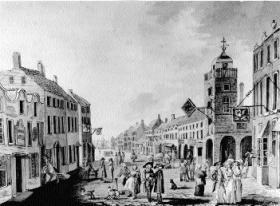
High Street, Belfast—Russell was invited to join several political clubs, in which he met the town’s radical Presbyterian merchants and manufacturers.
McArt’s fort, Cave Hill
The position also provided the ideal cover for him to work as a United Irish organiser and to become one of the leading contributors to the Northern Star newspaper, writing some of its most hard-hitting articles. In 1794-5 Russell was a key figure in transforming the United Irishmen into a popular republican secret society, and he was one of the select group that included Tone, Neilson and McCracken which, in June 1795 on top of McArt’s fort at Cave Hill overlooking Belfast, swore the celebrated oath ‘never to desist in our efforts until we had subverted the authority of England over our country, and asserted our independence’. Throughout the mid-1790s he travelled widely throughout Ulster, recruiting and organising the new mass movement. There were reports of him operating throughout Antrim, Down, Tyrone, Donegal and Sligo, recruiting for the United Irishmen. In September 1795 an informer reported that ‘Capt. Russell of Belfast has been appointed to the command of all the societies in the province of Ulster’; while some time later, one of the government’s most reliable agents informed the Castle that the United Irishmen were ready to rise and that ‘Russell…now conducts all their plans’. His role as a United Irish recruiter was commemorated in the well-known ballad ‘The man from God-knows-where’, in which a stranger rides into a village on a snowy night, and converses for a time with the locals, before riding out on his mysterious business.
Social radical
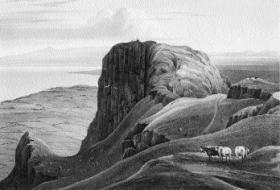
McArt’s Fort, Cave Hill—it was here in June 1795 that a select group that included Russell, Tone, Neilson and McCracken, swore the celebrated oath ‘never to desist in our efforts until we had subverted the authority of England over our country, and asserted our independence’. (Ulster Museum)
During his travels Russell sought out the company of working people. He often discussed politics and the great events unfolding in Europe with them, shared their homes and food and came to admire their generosity and to respect their political understanding. No other prominent United Irishman proclaimed the rights of the common man as loudly, particularly in his pamphlet A letter to the people of Ireland (1796), the fullest exposition of his democratic outlook. In this he castigated the aristocracy for stalling progress towards reform in the 1780s, their moral corruption, their unworthiness to govern, and their useless, parasitic existence. He accused them of using their powers and privileges to frustrate the divine plan of liberty and justice for all, and contended that all men have not only the right, but indeed the duty, to concern themselves with government and politics. Only if legislation seeks to serve ‘the whole family of mankind’, rather than just self-interested minorities, can there be some hope that it will reflect the natural justice ordained by God.
Russell looked to a simpler, purer form of government—something akin to the withering away of the state—in which the will of a benevolent deity could operate untrammelled by greed and corruption and man could realise those rights accorded him by nature. This was his long-term hope—in the meantime he believed that it was his duty to work towards this point by seeking to achieve measures such as the complete abolition of the penal laws and a reform of parliament to make it genuinely responsive to the popular will.
But Russell was fully aware that political reform could seem irrelevant to the poor, and was adamant that it must be accompanied by radical social change.
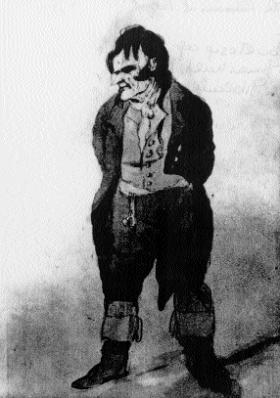
Caricature of Russell (right) as ‘The Librarian at Belfast’, the ideal position for a man of his varied interests. (Linen Hall Library)
He believed that radical changes to the existing system of property-holding were required to alleviate the plight of the poor, and was aware of the many undesirable social consequences that accompanied the early stages of industrialisation. He criticised the unwholesome conditions under which people worked in the new cotton mills, and the uncaring attitude of government and aristocracy towards a poverty produced largely by their own greed. As a magistrate in Dungannon he had taken the side of local linen weavers in their disputes with their employers. While many radicals took a hostile view of tradesmen’s combinations, seeing them as an obstacle to the self-regulating harmony of the market, Russell looked upon them with approval and, in an article in the Northern Star, encouraged their formation—among labourers and cottiers as well as tradesmen.
His feeling for the poor was more than just ideological; Russell came from a middle-class family whose fortunes were on the slide—money, or the lack of it, was a constant theme in family correspondence. When some philosophically-minded Belfast acquaintances spoke to him of the unimportance of money he is said to have exclaimed in some exasperation, ‘A man must dine!’ Although regarded as a gentleman on account of his bearing and military rank, Russell lived in straitened circumstances for most of his life and had a genuine empathy with the poor. Such feelings and his uncompromising radicalism earned him the respect of the more extreme democrats in Belfast, who were convinced of his readiness to take up arms. His sympathy with the poor and his pro-Catholic leanings also enabled him to make overtures to the Defenders, and he and his close friend Henry Joy McCracken were the key figures in forming the alliance between the northern United Irishmen and the Defenders.
Arrested
Such activities increasingly alarmed the authorities and on 16 September 1796 they finally struck. A large military force descended on Belfast, sealed off the town, and arrested several leading United men, including Russell. Charged with high treason, Russell was held in Newgate prison, but unlike fellow United leaders was not released before 1798. During the insurrection of that year he could only chaff at his inactivity, and his revolutionary zeal was further stoked by the deaths of close friends such as Tone and McCracken. He was considerably more reluctant than most of his colleagues to come to terms with the government after the rising and even from prison was one of the chief organisers of United Irish plans for insurrection in the early part of 1799.
Packed off to the remote Fort George in Scotland by a nervous Irish government in March 1799 he was detained for another three years. His resolve, however, remained unshaken and his letters from these years reveal a determination to take up the fight again at the first available opportunity. They also reveal the extent to which millennialist views had gripped his mind. His years in prison had given him time to brood on the state of the world and increasingly he found sense and solace in biblical prophecies. The combined effect of the continuation of the war in Europe, its spread to the Middle East, and the bloody summer of 1798 in Ireland, seems to have only intensified his belief that the world was then engaged in the time of troubles which St John had foretold would precede the coming of Christ’s kingdom. Around this time his political and religious views crystallised into a conviction that the Second Coming was at hand and it was his duty to prepare the way for the establishment on earth of a Christian utopia. This would be done by eliminating throughout the world the injustices being perpetrated by war-mongering monarchies which ran counter to God’s will, such as the oppression of the poor, sectarian discrimination and the slave trade. He believed that the current war was ‘not a contest for relative power or riches…but is a contest between the two principles of despotism and liberty, and can only terminate in the extinction of one or other, reason and religion leave one no doubt which will triumph’. When victory had been assured and the world had been made ready to receive Him, then Christ would come to earth again and rule over this earthly paradise for a thousand years—‘the millennium’.
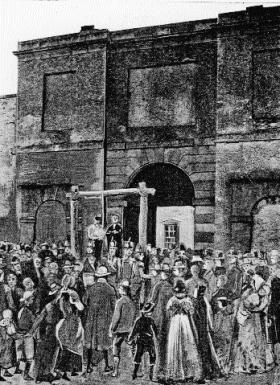
Execution of Thomas Russell at Downpatrick Jail, October 1803. (Ulster Journal of Archaeology)
In the intensity with which he held this belief, and all his beliefs, there is much of the archetypal Romantic about Russell. This was particularly evident in the depth of his passions and the emotional turmoil that characterised his personal life, notably his anguished reaction to his heavy drinking and sexual permissiveness. Prone to brooding and self-doubt, he often subjected himself to rigorous self-examination and tended to lapse into bouts of morbid despair. On his thirtieth birthday, imprisoned in Newgate, he wrote:
to my sorrow I think I am not so good as I was a year since. I have relapsed into fornication and lust and my temper is become more irritable…and [my] swearing has increased…I will endeavour in future to avoid intoxication on any account…this will enable me likewise to guard more against women, and I hope when released from this prison to abstain from them till marriage. I will endeavour to gain a complete mastery over my passionate temper…oh Lord God Almighty …thou knowest the secrets and sorrows of my heart…it is not from thy justice, before which I stand condemned, that I expect salvation, but from thy tender mercy that I hope for pardon and forgiveness, through my Lord and Saviour, Jesus Christ.
Russell’s personal failings were in fact something of a spur to his political career. He frequently contrasted his shame at his private behaviour with his pride in his political activism, seeing the latter as a way of compensating for his moral failings, and the only means of redemption open to such an incorrigible sinner.
Released
After the peace of Amiens he was released in June 1802, and went to Paris where he became involved in various conspiracies with Irish republican exiles. He was finally summoned back to Ireland in spring 1803 by Robert Emmet, whom he had met soon after his release, to assist in his plans for insurrection. Emmet believed that Russell’s name would be of great use in helping to raise Ulster, and he gave him the rank of general. While Emmet prepared for rebellion in Dublin Russell went north claiming that he would raise an army of 50,000 men. However, he had not set foot in the province for over six years and was sadly out of touch with the way in which opinion had changed after the crushing defeat of 1798. He rode throughout Antrim and Down exhorting the people to rise but the response he met was typified by that of a farmer from Clough, County Down, who claimed ‘they would be hanged like dogs’ if they took up arms. This reluctance was confirmed by news of Emmet’s failure in Dublin on 23 July 1803, and the absence of any sign of a French landing. Russell had no choice but to call off his efforts and he went into hiding, but on learning of Emmet’s arrest in September he made his way south to Dublin to attempt to rescue him. While Russell planned his next move, an informer notified the authorities of the presence of a suspicious stranger in an upstairs room in a house in Parliament Street, only a stone’s throw from Dublin Castle. They acted immediately and Russell was arrested on 9 September. Even King George III was gratified by his arrest but, never the clearest of thinkers on Irish matters, appeared to confuse him with Emmet by remarking that his correspondence with Sarah Curran was ‘curious’.
To encourage the people of Ulster in their new-found loyalty the government decided to make an example of Russell in south Down, where he had most vigorously attempted to foment insurrection. He was tried and found guilty on charges of high treason in Downpatrick. By this stage his millennialist zeal was stronger than ever, to the extent that even some of his friends questioned his sanity. When receiving communion in prison, Russell ‘in the cant of the enthusiast began to speak of the kingdom of Jesus, [and] the fulfilling of the prophecies relating to the bringing home of the Jews, which he said was now commencing, that the French arms were the instruments God would use for the purpose’. In his defiant speech from the dock he recalled with pride his political activities over the past thirteen years which he said had been for the good of Ireland and the world; he described himself as a ‘soldier of the Lord Jesus Christ’, claimed that the world was on the verge of great changes and requested that he be given time to complete a commentary on the Book of Revelations. In denying this request the judge observed that if he was to be allowed time to make the Book of Revelations intelligible, he would live longer than most of those present in the court. Russell was hanged and beheaded at Downpatrick jail on 21 October 1803, and buried in the nearby Church of Ireland graveyard, where a simple stone slab marks his grave.
James Quinn is Executive Editor of the Royal Irish Academy’s Dictionary of Irish Biography.
Further reading:
J. Quinn, Soul on Fire: a life of Thomas Russell (Dublin 2002).
C.J. Woods (ed.), Journals and Memoirs of Thomas Russell, 1791-5 (Dublin 1991).
D. Carroll, The Man from God Knows Where (Dublin 1995).
S.N. Mac Giolla Easpaig, Tomás Ruiséil (Dublin 1957).
McArt’s Fort, Cave Hill—it was here in June 1795 that a select group that included Russell, Tone, Neilson and McCracken, swore the celebrated oath ‘never to desist in our efforts until we had subverted the authority of England over our country, and asserted our independence’. (Ulster Museum)
















